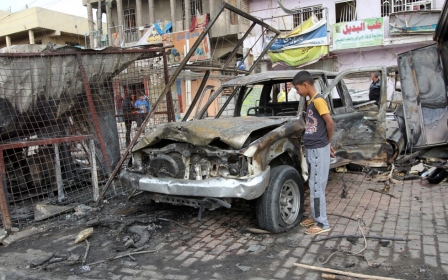Iraq closes notorious Abu Ghraib prison

The Iraqi government has made the decision to close the controversial Abu Ghraib prison, less than two weeks before the 10th anniversary of the scandal over U.S. complicity in abuses at the prison. Baghdad central prison, as it is officially known, was notorious as a torture centre under both the Ba’athist regime of dictator Saddam Hussein and the US-led coalition that came to power after his overthrow.
In a statement, the Ministry of Justice announced, “the complete closure of Baghdad central prison, previously Abu Ghraib, and the removal of the inmates in co-operation with the ministries of defence and justice.”
The increasing violence and instability in the region, as well as an attempted assault on the prison in June 2013, apparently prompted the move, with Justice Minister Hassan al-Shammari announcing the closure “as part of precautionary measures related to the security of prisons.” All 2400 inmates arrested or sentenced for terrorism-related offences have been transfered to other facilities.
The prison was originally constructed in the otherwise sparse farming community by the British in 1950’s, during the pro-Western rule of King Faisal. After the coming to power of Saddam Hussein’s military dictatorship, the prison became one of Hussein’s most prominent torture dungeons thought to have held as many as 50,000 men and women at one point. Below a portrait of Hussein at the main gate read the caption: “There is no life without the Sun and no dignity without Saddam.”
After the ouster and later execution of Saddam Hussein following the 2003 invasion of Iraq, the new Iraqi government in cooperation with the US-led coalition, took control of the site for use in combatting the insurgency. The US-run facility on the site was known as “Camp Redemption”.
Stay informed with MEE's newsletters
Sign up to get the latest alerts, insights and analysis, starting with Turkey Unpacked
Centre still a byword for prisoner abuse
The 29th of April will mark the 10th anniversary of the release of graphic photos on CBS 60 Minutes showing the abuse inflicted upon Iraqi prisoners by American soldiers, which led to an international scandal and the conviction of 11 people on a variety of charges including maltreatment, aggravated assault and battery. In 2004, a report by Major General Antonio M. Taguba was obtained by New Yorker magazine, which detailed the acts of abuse committed by U.S. soldiers within the prison including “punching, slapping, and kicking detainees”, “Sodomizing a detainee with a chemical light” and “Placing a dog chain or strap around a naked detainee’s neck and having a female Soldier pose for a picture.”
Last month the Centre for Constitutional Rights, an American legal advocacy organisation, called for a re-opening of the case against a US private military contractor that conducted interrogations at Abu Ghraib. The case, brought by four Iraqi detainees against CACI Premiere Technology Inc. accused the company of directing soliders to commit, “sadistic, blatant, and wanton criminal abuses.” The case was originally dismissed by a federal judge in June 2013, using the precedent of ‘Kiobel vs Shell/Royal Dutch Petroleum’, which found that the British oil company shell could not be found accountable in a US court for rights violations committed in Nigeria.
The Center for Constitutional Rights Legal Director Baher Azmy criticised the ruling. “US courts must at last provide a remedy for the victims of torture at Abu Ghraib,” said Azmy. “CACI indisputably played a key role in those atrocities, and it is time for them to be held accountable. The lower court’s ruling creates lawless spaces where corporations can commit torture and war crimes and then find safe haven in the United States. That’s a ruling that should not stand.”
Middle East Eye delivers independent and unrivalled coverage and analysis of the Middle East, North Africa and beyond. To learn more about republishing this content and the associated fees, please fill out this form. More about MEE can be found here.




